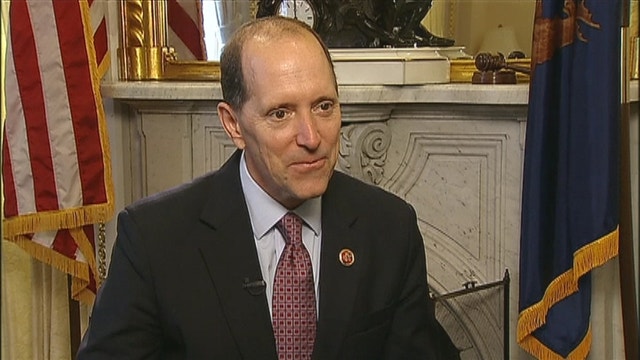Can Washington Really Reform the Tax Code?
Despite skepticism Washington can overhaul the tax code, House Ways and Means Committee Chairman Dave Camp (R-MI) optimistically continues his push to write a new federal tax system, even vowing to consider using the upcoming debt limit fight to force bipartisan action on the issue.
“Any opportunity to advance tax reform, I’m on that street” said Camp in an exclusive interview with FOX Business. “And it could be an opportunity, certainly, to get the kind of process and procedures to move tax reform through the Congress. I think it’s probably very difficult to have a tax reform just deposited in the debt limit in total but, again, I think it’s an opportunity that I’m going to pursue.”
Camp and Republicans argue Congress should dedicate any revenue raised through eliminating or reducing tax preferences to decreasing marginal rates. Camp said President Barack Obama committed to that position, known as revenue neutrality.
“When he came to the Congress and I had a chance to talk to him about it, we engaged on tax reform and he made a commitment that he’s interested in revenue-neutral corporate reform” said Camp.
At a Wednesday budget briefing, White House officials described that commitment as a compromise, acknowledging the president prefers raising additional revenue through corporate tax reform.
“The President believes that these measures should be eliminated … they should help contribute to the deficit,” said White House economic adviser Gene Sperling of certain business tax deductions. “But again, if this is going to be a once-in- a-generation moment to have comprehensive corporate tax reform … then he's willing to do that in a revenue-neutral way.”
In the debate over taxes for individuals, the White House has proposed reducing tax deductions to raise an additional $580 billion in revenue over the next decade, directly at odds with the Republican position.
“We’ve got to get our fiscal house in order, as part of that, we need to raise more revenue, and we think that tax reform ought to produce that ability to both raise revenue, simplify the tax code,” said Treasury Secretary Jack Lew Thursday at a congressional hearing.
For Republicans, this amounts to a deal-breaking tax increase.
“We should not piecemeal this,” said Camp of the administration’s proposal to curb deductions solely to raise tax revenue. “If you piecemeal and just take one or two provisions, you may get static revenue or a little bit of money for one year, but you’re not going to get the long-term growth that we need to see.”
Adding to White House calls for more revenue are questions regarding Camp’s Senate counterpart, Finance Committee Chairman Max Baucus (D-MT). Baucus told The Washington Post, “The question is what to do with the revenue. Republicans want to use it for rate reduction. Democrats want debt reduction… Let’s postpone a decision on that and work through the code and see how much this base-broadening actually gets us.”
“I’m OK with that approach,” said Camp. “I mean, clearly the House and Senate are going to take different approaches and that’s not new. I mean, in every bill we do that, and then have a conference agreement resolving differences. But what’s important is that he’s engaged in the idea of tax reform, of comprehensive reform for both families and individuals, and for business.”
Analysts and congressional aides have questioned whether such differences on fundamental tax policy are too difficult for tax reform efforts to overcome.
“Anything worth doing is hard to do,” said Camp. “So I’m not concerned about how difficult it is.”




















